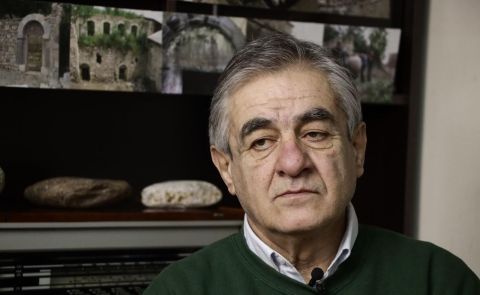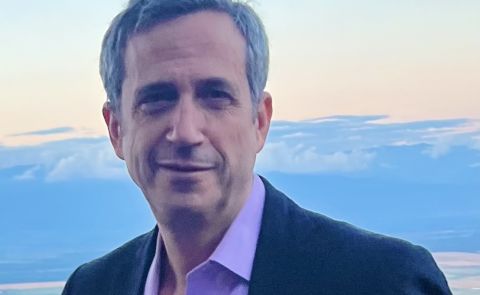
Giorgi Gakharia: The EU Should Engage Georgia Despite Its Democratic Backsliding

Giorgi Gakharia, Georgia’s former Prime Minister (2019–2021), previously served as Minister of the Economy and Interior. He resigned from the ruling Georgian Dream (GD) party in 2021 and founded the For Georgia Party.
The party advocates for recommitment to Europeanized governance, emphasizing the rule of law and anti-corruption measures. This resonates with younger, professional Georgians who grew up in post-independence Georgia. In the 2021 local elections, the party secured 7% of the vote, though Georgia’s electoral system poses challenges for newcomers.
Gakharia’s 2021 resignation marked an ideological, rhetorical, and political shift in Georgia, coinciding with Russia’s invasion of Ukraine, which reshaped the region. Georgia’s relationship with the EU has since been “frozen,” while economic ties with Russia have strengthened. Gakharia’s platform seeks to restore Georgia’s three-decade-long pro-Western trajectory.
Following the controversial “Successor Parties Law,” which bans opposition groups deemed hostile to the state, Caucasus Watch interviewed the former Prime Minister. This discussion explores Georgia’s emerging ideological divides.
How divided is Georgia over foreign and security policy? Is your opposition more about Georgia’s foreign policy or its socioeconomic consequences? When did you realize you could not align with the current government?
Since independence, Georgia’s foreign and security policy has maintained remarkable continuity. However, the ruling Georgian Dream (GD) has recently pivoted away from our Euro-Atlantic course, disrupting this consensus. Public opinion confirms strong support for Euro-Atlantic integration, despite sustained anti-Western propaganda. The aspiration for a European future unites Georgians.
Foreign policy has historically guided domestic development. We view Euro-Atlantic alignment not only as a security guarantee but also as a path to democracy, robust institutions, and an inclusive society. This vision is enshrined in our Constitution.
However, an alternative paradigm—realignment with Russia’s sphere of influence—offers neither stability nor security. Historical and contemporary evidence shows Russian influence fosters corruption, opacity, and authoritarianism. Russia continues to occupy Georgian territory, waging hybrid campaigns to undermine our sovereignty, weaken institutions, and reassert control. The current government’s actions increasingly align with this agenda.
My turning point came when I could no longer reconcile my commitment to Georgia’s democracy and Western orientation with GD’s direction. The shift from Euro-Atlantic values and democratic norms was initially subtle but became undeniable. At that point, I and like-minded colleagues left the party, and I resigned as Prime Minister.
This divergence became stark after Russia’s full-scale invasion of Ukraine. Instead of condemning Russian aggression, the Georgian government adopted an ambiguous, often anti-Western stance. GD perceives European integration as a threat to its power, as it demands transparency, power-sharing, and inclusivity—challenges to an increasingly autocratic elite.
While direct evidence of GD-Kremlin collusion is scarce, the pattern is clear: eroded democratic checks, subjugated institutions, state capture, fraudulent elections, violent suppression of protests, imprisonment of activists, and authoritarian laws. These tactics echo Moscow’s playbook, as impartial observers can attest.
Georgia’s ties with Western partners have deteriorated. Our U.S. strategic partnership has stalled, NATO integration efforts are suspended, and EU relations are severely strained. Russia exploits this vacuum, increasing Georgia’s vulnerability.
Abkhazia is rumored to host the next major Russian base in the Black Sea, as Crimea is within range of Ukrainian attacks. What are the implications for Georgia if the base becomes a target for Ukrainian or NATO forces? In this context, what does the term “Global Party of War” mean to you?
A Russian military base in Abkhazia, particularly at Ochamchire port, would have significant regional consequences.
The Black Sea is a strategically vital, enclosed maritime space, serving as both a military frontier and a key East-West corridor. Regional security hinges on coastal control. Previously, NATO aspirants Georgia and Ukraine collaborated with Bulgaria, Romania, and Turkey to build a new security architecture. That cooperation has waned.
Ochamchire is no match for Sevastopol militarily, but Russia’s control over Crimea, the Sea of Azov’s coastline, and Ochamchire strengthens its dominance over the Black Sea’s northern and eastern shores, creating a platform for further aggression.
Additionally, a Russian base in Ochamchire would hinder regional infrastructure and economic initiatives, such as the Middle Corridor and connectivity projects aimed at reducing reliance on Russian-dominated routes. The Anaklia Deep Sea Port, a vital East-West gateway near Ochamchire, would face severe challenges if the area is militarized.
This is a familiar Russian strategy. Since the 1990s, when Georgia emerged as a regional transit hub, Russia has used military and political means to disrupt strategic projects.
Internally, the GD government’s narrative portrays Western partners and the transatlantic security system as aggressors, part of a so-called “Global Party of War.” This is a dangerous distortion. By labeling allies as warmongers, GD aligns with Kremlin narratives, eroding Georgia’s sovereignty and security.
The “Global Party of War” is a political construct to justify inaction and appeasement, discredit Georgia’s allies, isolate the country, and weaken its position.
The Georgian PM has been a guest of honor at CPAC in Budapest, aligning ideologically with certain Washington circles. The dismissal of the “Global Party of War” aligns with Budapest’s “realism” toward Russia and the Trump administration’s push to end the Ukraine war. Given Georgia’s location and geopolitical constraints, is this policy foresighted?
GD initially governed as a center-left movement with socially oriented policies. However, fearing loss of power, its leadership abandoned these values for a radical right-wing, Eurosceptic populism.
GD’s alignment with Hungary’s Fidesz and Viktor Orbán is both paradoxical and calculated. It adopts Orbán’s anti-democratic methods and narratives while maintaining superficial Western engagement to preserve a façade of European commitment. This dual strategy misleads domestic and international audiences, claiming European credentials while undermining democratic values and Euro-Atlantic integration.
GD shows no genuine interest in resolving the Ukraine war justly. Its populist messaging and conspiracy-laden narratives mirror Russian disinformation, blaming the West for Russia’s invasion and accusing allies of pressuring Georgia to open a second front.
This is not realism but an immoral and irresponsible stance. Given our region’s volatility, Georgia must strengthen cooperation with Western allies, particularly in defense and security.
Georgia faces the constant threat of renewed conflict. We must reinforce strategic ties with Western partners, who have supported us in crises and remain the only credible guarantors of security and sustainable development.
Loyalty to Moscow undermines Georgian sovereignty, alienates allies, and jeopardangers our democratic future.
In November 2024, the Georgian government suspended EU accession talks until 2028. The economy has benefited from re-exporting to Russia, as has Armenia’s, and an influx of wealthy Russian professionals, including IT workers. Meanwhile, China promises infrastructure investment, including in Anaklia port. In a transactional world order, is Georgia simply adopting a “what’s good for business” approach?
Georgia’s actions transcend a simplistic “what’s good for business” philosophy. The suspension of EU accession until 2028 and the economic reorientation toward Russia and China reflect a deliberate shift from Georgia’s long-standing development paradigm. This is not pragmatic but an opportunistic strategy prioritizing short-term gains.
Unregulated, often illicit capital, including Russian funds, fuels an illusion of economic dynamism but poses long-term risks. Without oversight, systemic corruption could transform Georgia into a regional money-laundering hub.
This sustains GD’s power through law enforcement, elite patronage, and propaganda. Notably, the owner of Imedi TV faces potential sanctions from European states, including the U.K. While economic engagement with diverse partners is necessary, transactionalism cannot replace strategic orientation.
Rejecting the EU path forfeited billions in financial aid for transformative reforms, social welfare, and inclusive growth. This was a missed opportunity to build a stronger, fairer society.
We advocate a foresighted economic strategy rooted in human capital, ensuring universal access to education, healthcare, and social protection. My vision is a modern, European, democratic Georgia that upholds justice, solidarity, and shared prosperity.
In a society with concentrated wealth, how concerned are you about engaging with partners that do business with fewer political strings attached?
Bidzina Ivanishvili’s regime prioritizes power over democratic development, entrenching an authoritarian framework incompatible with open governance.
The regime maintains access to Western markets despite criticizing democratic backsliding. This enhances Georgia’s appeal for unregulated capital. This dual strategy—autocracy at home, open financial channels abroad—sustains the current power structure.
This approach is neither pragmatic nor defensible. Speculative capital creates no sustainable value, jobs, or investment in human capital.
Georgia’s economic relationships must align with our strategic priorities. Transactional partnerships are inevitable, but strong institutions and checks must ensure capital contributes to long-term goals: decent employment, inclusive infrastructure, and shared prosperity.
As an opposition leader, what do you hope for EU policy toward Georgia? Should it remain engaged to maintain influence or apply pressure, risking deeper rupture?
I am unequivocally committed to Georgia’s European future. Despite anti-European propaganda, most Georgians view integration as a national aspiration, uniting diverse societal segments.
The EU faces challenges, including imposing sanctions on GD leaders. Yet, Georgia’s democratic development and European trajectory must remain a priority. Continued, intensified EU engagement is essential amid Georgia’s systemic political crisis. We are working with European partners to ensure this.
GD’s transactional approach to the EU presents both a challenge and an opportunity. If the EU maintains Georgia’s candidate status, questions the government’s legitimacy, and conditions engagement on democratic reforms, freeing political prisoners, and holding new elections, it can pressure the regime while preserving future progress.
This must include increased support for civil society, independent media, and democratic institutions. The EU should engage because of these challenges, standing with those striving for democratic values and a European future. EU integration is vital for the opposition, civil society, and Georgia’s long-term modernization, especially in the post-Ivanishvili era.
Interview conducted by Ilya Roubanis
See Also


Irina Mamulashvili: Electoral Interference is a Playbook, not a Recipe

Peace or Capitulation? Shahverdyan on Armenia-Azerbaijan Agreement and the Nagorno-Karabakh Crisis

Ali Mousavi Khalkhali: Iran Will Avoid Conflict in the Caucasus

Aram Suren Hamparyan: Let’s Not End Up With Less Land and Less Peace

